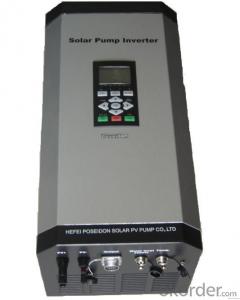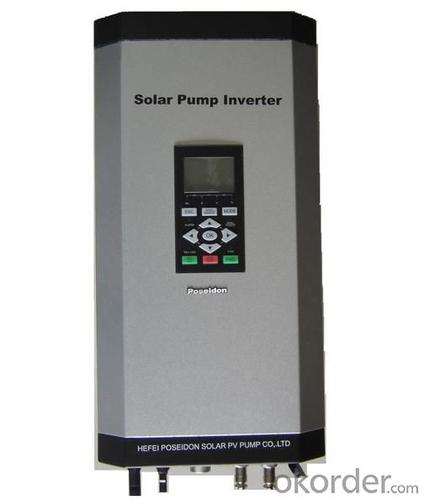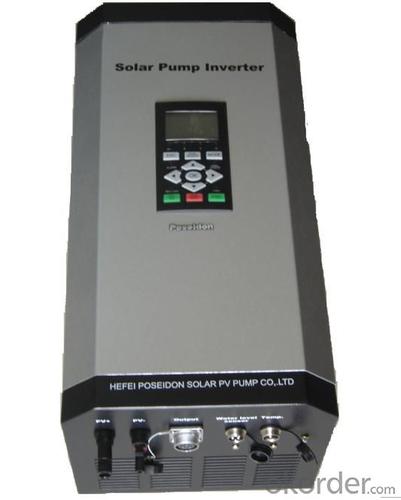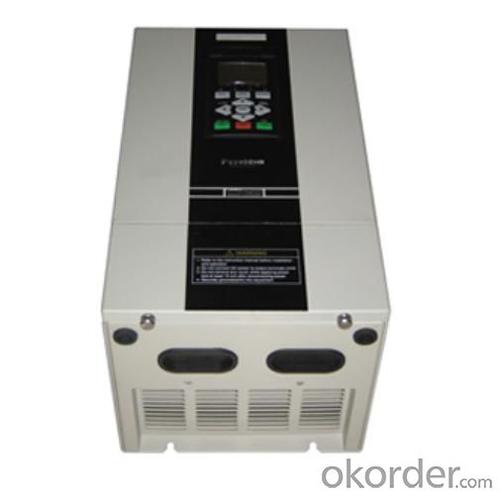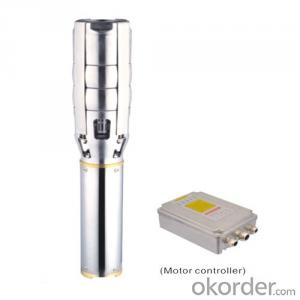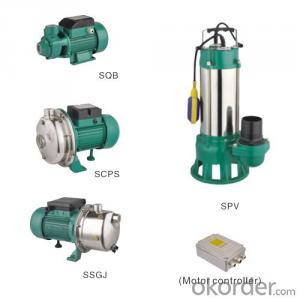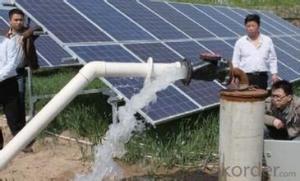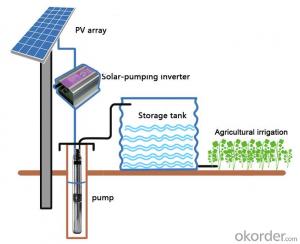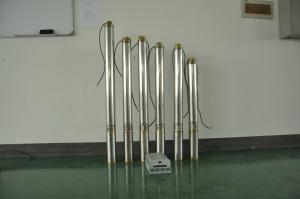Solar Pump With Backup Battery FCPM7K5H
- Loading Port:
- China Main Port
- Payment Terms:
- TT OR LC
- Min Order Qty:
- -
- Supply Capability:
- -
OKorder Service Pledge
Quality Product, Order Online Tracking, Timely Delivery
OKorder Financial Service
Credit Rating, Credit Services, Credit Purchasing
You Might Also Like
Solar pump inverter FCPM7K5H Product Description:
Product Description:
Solar water pumping system is constructed with solar panel array,solar pump inverter and AC water pump, DC current produced from solar panel will be delivered to solar pump inverter,and it will convert it into AC current to drive water pump,and will automatically regulate output frequency according to sun radiance intensity,maximally realize MPPT tracking function.
Product Features
Adopting the proposed dynamic VI maximum power point tracking (MPPT) control method, with fast response, and reliable operation, achieves efficiency of 99%.
Designed with variable frequency driver, greatly improves efficiency
Extremely high efficiency
Digital mode control, with automatic operation and manual operation mode options
Complete protection functions
Adopts intelligent IPM module, with high reliability
LCD display and operation panel, in real time presents operating data
Optional for water level measurement and control circuit
Applicable for general ACC pumps, like centrifugal pump, piston pump etc.
Independent intellectual property; Highly effective, the redundant reliability, exempts the maintenance and the long life.
The pumps are soft started, fully protected.
No batteries are used. So better Sunlight, more water
Datasheet.
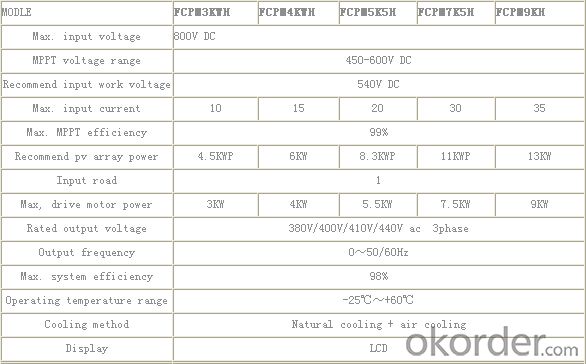
- Q: Can a solar pump be used for residential swimming pool heating?
- Yes, a solar pump can be used for residential swimming pool heating. Solar pumps utilize solar energy to circulate and heat the water in a swimming pool, making them an eco-friendly and cost-effective option for pool heating. By harnessing the power of the sun, solar pumps can efficiently warm the pool water, providing a comfortable swimming experience while reducing energy consumption and lowering utility costs.
- Q: How do I choose the right size of solar pump for my needs?
- To choose the right size of solar pump for your needs, you should consider factors such as the volume of water you need to pump, the distance it needs to be pumped, the elevation it needs to be lifted, and the amount of sunlight available in your location. Additionally, consider any future expansion plans or potential increase in water requirements. Consulting with a solar pump expert or manufacturer can also provide valuable guidance to determine the appropriate size for your specific needs.
- Q: Are there any maintenance requirements for solar pumps?
- Yes, solar pumps require regular maintenance to ensure optimal performance and longevity. This includes cleaning the solar panels to remove dirt and debris, checking the pump's connections and wiring for any damage or loose connections, inspecting and lubricating moving parts, and monitoring the pump's performance regularly. Additionally, batteries, if used, may require periodic maintenance such as checking fluid levels and cleaning terminals. Proper maintenance helps to maximize the efficiency and reliability of solar pumps.
- Q: What is the installation process for a solar pump?
- The installation process for a solar pump typically involves the following steps: 1. Site Assessment: Determine the optimal location for the solar panels and pump system by considering factors such as sunlight exposure, water source proximity, and accessibility. 2. Mounting the Solar Panels: Install the solar panels in a location where they can receive maximum sunlight exposure, typically on a roof, ground-mounted rack, or pole mount. 3. Wiring and Connection: Connect the solar panels to the pump controller using appropriate wiring and connectors. Ensure proper polarity and secure connections to avoid any electrical issues. 4. Mounting the Pump: Install the pump in the desired location, ensuring it is securely anchored. Connect the pump to the water source, such as a well or water storage tank. 5. Installing the Pump Controller: Mount the pump controller near the solar panels, ensuring it is protected from harsh weather conditions. Connect the pump, solar panels, and batteries (if applicable) to the controller. 6. Testing and Commissioning: Test the system by turning on the pump and checking for proper functionality. Adjust settings on the pump controller, such as flow rate or pressure, as needed. 7. Maintenance and Monitoring: Regularly inspect and clean the solar panels to maintain their efficiency. Monitor the system's performance, including water flow, power generation, and battery charge (if applicable), to ensure optimal operation. It is important to note that the specific installation process may vary depending on the type and model of the solar pump system and local regulations. It is advisable to consult the manufacturer's installation guidelines or seek professional assistance for a successful installation.
- Q: How does a solar pump handle water source contamination from pesticide runoff?
- A solar pump does not have the capability to handle water source contamination from pesticide runoff. It simply pumps water from a source and does not have any built-in mechanisms to filter or treat contaminated water. Therefore, if the water source is contaminated with pesticide runoff, a separate water treatment system would be required to address the issue.
- Q: How much water can a solar pump supply?
- The supply of water from a solar pump is influenced by various factors. These factors include the size and capacity of the pump, the intensity of sunlight, and the efficiency of the system. In general, solar pumps can provide anywhere from a few hundred liters to several thousand liters of water per day. However, it is important to consider that this estimate can vary significantly depending on the specific circumstances and conditions at the installation site. Furthermore, the depth of the water source, the distance the water needs to be lifted, and the required pressure can also affect the pump's ability to supply water. Therefore, it is recommended to seek guidance from a professional or consult the manufacturer's specifications for a more precise estimate of the water supply capacity of a particular solar pump model.
- Q: Can a solar pump be used in remote areas with no access to the power grid?
- Yes, a solar pump can be used in remote areas with no access to the power grid. Solar pumps are designed to operate using solar energy, which means they do not require connection to the power grid. They can be an effective and sustainable solution for providing water supply in remote locations where traditional electricity is unavailable.
- Q: Is there any noise generated by a solar pump system?
- Yes, there may be some noise generated by a solar pump system, but the level of noise is generally minimal compared to traditional pump systems. The noise is mainly produced by the mechanical components, such as the motor and pump, but it is typically much quieter than systems powered by electric or diesel motors.
- Q: Can a solar pump be used in natural swimming pools?
- Yes, a solar pump can definitely be used in natural swimming pools. Solar pumps are a great option for natural swimming pools as they are environmentally friendly and energy-efficient. They use the power of the sun to operate, which means they do not require electricity from the grid, making them a sustainable choice. Solar pumps can circulate and filter the water in the pool, helping to maintain water quality and prevent stagnation. They can also be used to power water features such as fountains or waterfalls, adding aesthetic appeal to the pool. Additionally, solar pumps are quiet, low maintenance, and cost-effective in the long run, making them an ideal choice for natural swimming pools.
- Q: How does the size of the water pipe affect the performance of a solar pump?
- The size of the water pipe affects the performance of a solar pump by influencing the flow rate and efficiency of water delivery. A larger pipe diameter allows for a higher flow rate, resulting in increased water output from the pump. It also reduces friction and pressure losses, leading to improved pump efficiency. Conversely, using a smaller pipe diameter restricts the flow, reducing the pump's performance and potentially causing issues such as decreased water delivery or increased energy consumption. Hence, selecting an appropriate pipe size is crucial to ensure optimal performance of a solar pump.
Send your message to us
Solar Pump With Backup Battery FCPM7K5H
- Loading Port:
- China Main Port
- Payment Terms:
- TT OR LC
- Min Order Qty:
- -
- Supply Capability:
- -
OKorder Service Pledge
Quality Product, Order Online Tracking, Timely Delivery
OKorder Financial Service
Credit Rating, Credit Services, Credit Purchasing
Similar products
Hot products
Hot Searches
Related keywords

